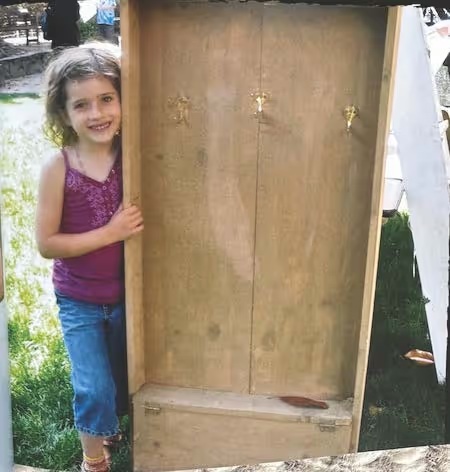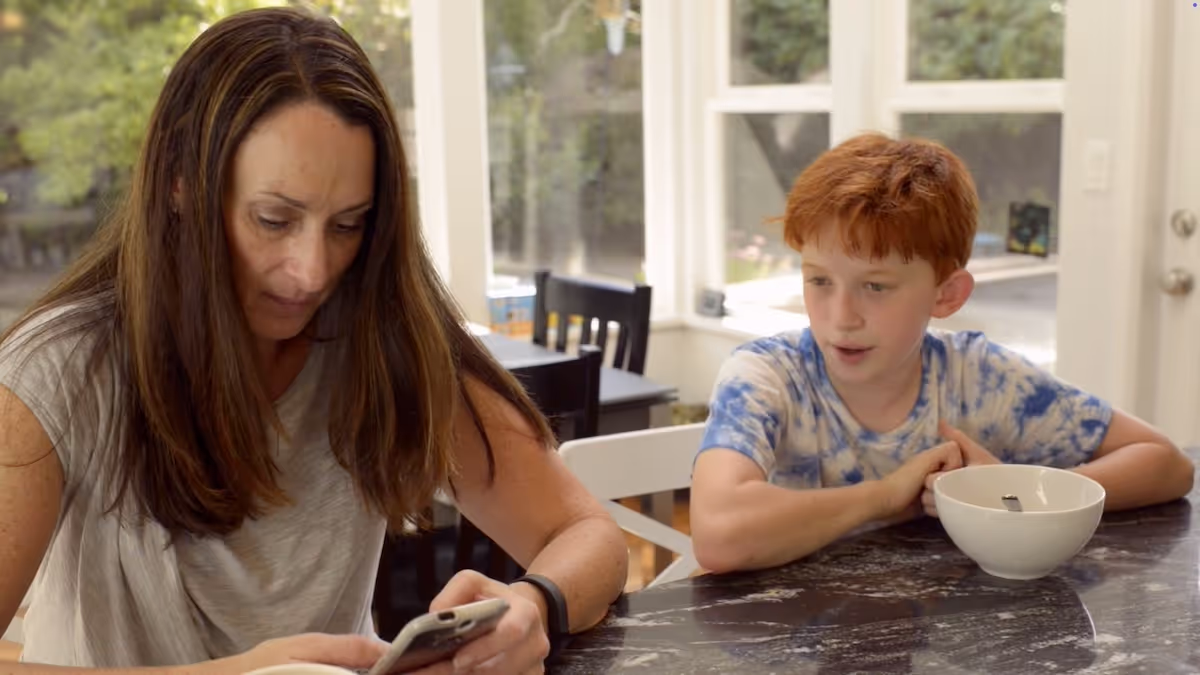


You will find the recording on my Screenagers Podcast Page, here.
Here is part of the transcript, but please listen in to hear the whole Blogcast:
"Today I'm talking about a summer reset, both in terms of screen time policies in our homes and ideas for things to do off screens. Summer's wide open time spans can heighten battles over technology use. This is a perfect time to revisit family guidelines and rules, what's working, and what's not.
So often, parents ask me how to put in rules after having gotten very lax about them. You can start by saying to your kids, “Look, it's summer, and it's time to reset family policies.”
Really wanting to hear our kids' input is called procedural justice — when they feel like we are taking the time to understand what they want and trying to make adjustments so that they feel heard and understood. Many studies have shown that even if people don't get their way, as long as they feel respected and they've had some say in the matter, they are much more likely to go along with rules —and it doesn't mean they're going get everything they want. Life has rules, and so home is a wonderful time to be practicing the self-discipline it takes to honor guidelines.
Resets can also happen when you gain insights into new scientific data related to the benefits of non-screen time things such as sleep and exercise. So by having a conversation about new science that you read, possibly on one of my blogs, particularly mental health issues, using that science to say, “Hey, I need to parent with integrity. And the science is showing that still having policies in the summer is really important to maintain your mental health and all of our mental health.”
Learn more about showing our movies in your school or community!
Join Screenagers filmmaker Delaney Ruston MD for our latest Podcast

Learn more about our Screen-Free Sleep campaign at the website!
Our movie made for parents and educators of younger kids
Learn more about showing our movies in your school or community!
What are some examples of policies that can happen in the summer, even with all the changing elements? Well, first and foremost, still have a time when devices are put away. For sleep time, that's critical. And even if that's later, because the days are longer, it's a time to say, 'Hey, what time makes sense? Maybe it's 10?' What do your kids think? And from there, one of the key things is to have the devices go in the parent's bedroom, as opposed to the myth that it needs to be in a common space.
Another rule is to find maybe a day, or a week, of summer when technology is completely put away other than when it's used as a tool for something like directions. Setting those days, even though there's going to be some leeway, I always say it's about maintaining an 80 to 90% consistency.
Equally important to ensuring that there is much time off screens is to be intentional about what are the things that people are going to do during the summer. And one of the topics that is important to talk about is expanding horizons. We want our kids to have new experiences in the summer.
Learn more about showing our movies in your school or community!
Join Screenagers filmmaker Delaney Ruston MD for our latest Podcast

Learn more about our Screen-Free Sleep campaign at the website!
Our movie made for parents and educators of younger kids
Join Screenagers filmmaker Delaney Ruston MD for our latest Podcast
It can be really fun to have a goal like “We are going to go to three new Indian restaurants to try out their naan. Or we're going to have the goal of visiting three statues this summer. And what goes along with this idea of expanding horizons is putting things on calendars. Just the other day, I know that my son is going to be here for part of the summer, so I have been looking for a concert in the park that I could get on the calendar. We have put on the calendar one night of backpacking, just the two of us. I know that if I get that on the calendar, it really increases the chance it will happen. And it's also a way to invite other people to join us."
...Listen in to hear the whole podcast episode here
As we’re about to celebrate 10 years of Screenagers, we want to hear what’s been most helpful and what you’d like to see next.
Please click here to share your thoughts with us in our community survey. It only takes 5–10 minutes, and everyone who completes it will be entered to win one of five $50 Amazon vouchers.
You will find the recording on my Screenagers Podcast Page, here.
Here is part of the transcript, but please listen in to hear the whole Blogcast:
"Today I'm talking about a summer reset, both in terms of screen time policies in our homes and ideas for things to do off screens. Summer's wide open time spans can heighten battles over technology use. This is a perfect time to revisit family guidelines and rules, what's working, and what's not.
So often, parents ask me how to put in rules after having gotten very lax about them. You can start by saying to your kids, “Look, it's summer, and it's time to reset family policies.”
Really wanting to hear our kids' input is called procedural justice — when they feel like we are taking the time to understand what they want and trying to make adjustments so that they feel heard and understood. Many studies have shown that even if people don't get their way, as long as they feel respected and they've had some say in the matter, they are much more likely to go along with rules —and it doesn't mean they're going get everything they want. Life has rules, and so home is a wonderful time to be practicing the self-discipline it takes to honor guidelines.
Resets can also happen when you gain insights into new scientific data related to the benefits of non-screen time things such as sleep and exercise. So by having a conversation about new science that you read, possibly on one of my blogs, particularly mental health issues, using that science to say, “Hey, I need to parent with integrity. And the science is showing that still having policies in the summer is really important to maintain your mental health and all of our mental health.”
What are some examples of policies that can happen in the summer, even with all the changing elements? Well, first and foremost, still have a time when devices are put away. For sleep time, that's critical. And even if that's later, because the days are longer, it's a time to say, 'Hey, what time makes sense? Maybe it's 10?' What do your kids think? And from there, one of the key things is to have the devices go in the parent's bedroom, as opposed to the myth that it needs to be in a common space.
Another rule is to find maybe a day, or a week, of summer when technology is completely put away other than when it's used as a tool for something like directions. Setting those days, even though there's going to be some leeway, I always say it's about maintaining an 80 to 90% consistency.
Equally important to ensuring that there is much time off screens is to be intentional about what are the things that people are going to do during the summer. And one of the topics that is important to talk about is expanding horizons. We want our kids to have new experiences in the summer.
It can be really fun to have a goal like “We are going to go to three new Indian restaurants to try out their naan. Or we're going to have the goal of visiting three statues this summer. And what goes along with this idea of expanding horizons is putting things on calendars. Just the other day, I know that my son is going to be here for part of the summer, so I have been looking for a concert in the park that I could get on the calendar. We have put on the calendar one night of backpacking, just the two of us. I know that if I get that on the calendar, it really increases the chance it will happen. And it's also a way to invite other people to join us."
...Listen in to hear the whole podcast episode here
Sign up here to receive the weekly Tech Talk Tuesdays newsletter from Screenagers filmmaker Delaney Ruston MD.
We respect your privacy.
You will find the recording on my Screenagers Podcast Page, here.
Here is part of the transcript, but please listen in to hear the whole Blogcast:
"Today I'm talking about a summer reset, both in terms of screen time policies in our homes and ideas for things to do off screens. Summer's wide open time spans can heighten battles over technology use. This is a perfect time to revisit family guidelines and rules, what's working, and what's not.
So often, parents ask me how to put in rules after having gotten very lax about them. You can start by saying to your kids, “Look, it's summer, and it's time to reset family policies.”
Really wanting to hear our kids' input is called procedural justice — when they feel like we are taking the time to understand what they want and trying to make adjustments so that they feel heard and understood. Many studies have shown that even if people don't get their way, as long as they feel respected and they've had some say in the matter, they are much more likely to go along with rules —and it doesn't mean they're going get everything they want. Life has rules, and so home is a wonderful time to be practicing the self-discipline it takes to honor guidelines.
Resets can also happen when you gain insights into new scientific data related to the benefits of non-screen time things such as sleep and exercise. So by having a conversation about new science that you read, possibly on one of my blogs, particularly mental health issues, using that science to say, “Hey, I need to parent with integrity. And the science is showing that still having policies in the summer is really important to maintain your mental health and all of our mental health.”

Thoughtful family tech rules help protect kids’ wellbeing, learning, and sleep while strengthening connection at home. Using the fresh start of a new year, this post shares eight practical tech habits families can discuss and adapt together, including shared social media check-ins, screen time inventories, device-free meals, regular gaming breaks, and keeping phones out of bedrooms at night.
READ MORE >
Psychologist Jean Twenge explains how parental controls can support healthier tech use by protecting sleep, limiting late night device access, and reducing kids’ exposure to content they are not developmentally ready to handle. She discusses why third party parental control tools are often more effective and easier to use than built in options, while acknowledging that no system is perfect. Clear boundaries, combined with technology based limits, can reduce ongoing conflict and make screen time rules easier to enforce.
READ MORE >
for more like this, DR. DELANEY RUSTON'S NEW BOOK, PARENTING IN THE SCREEN AGE, IS THE DEFINITIVE GUIDE FOR TODAY’S PARENTS. WITH INSIGHTS ON SCREEN TIME FROM RESEARCHERS, INPUT FROM KIDS & TEENS, THIS BOOK IS PACKED WITH SOLUTIONS FOR HOW TO START AND SUSTAIN PRODUCTIVE FAMILY TALKS ABOUT TECHNOLOGY AND IT’S IMPACT ON OUR MENTAL WELLBEING.
